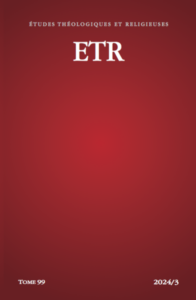La théologie agrarienne est d’un grand apport pour la réflexion sur l’écologie dans la Bible. L’objectif de Christel Koehler est de mettre l’accent sur ce que le livre d’Osée peut nous en apprendre. À partir de la lecture qu’Ellen Davis fait de certains livres prophétiques qu’elle qualifie d’agrariens (agrarian), on verra qu’une spécificité d’Osée est de lier la violence faite à la terre avec celle infligée aux structures familiales et au culte : l’adultère est la métaphore de crimes économiques et sociaux. À l’inverse, l’harmonie entre humains et avec la nature dépend de leur fidélité à Dieu, lequel répond à l’attente de la terre autant qu’à celle du ciel. En effet, l’écologie est peut-être bien une affaire de justice entre chaque humain et son frère.
Phrase : Un extrait du livre d’Osée est étudié en perspective agrarienne avec des enjeux écologiques.
Mots-clés : Osée, théologie agrarienne, Ellen Davis, écologie, livres prophétiques, justice
Hosea, agrarian prophet. Agrarian theology and ecology
Agrarian theology makes a major contribution to reflection on ecology in the Bible. This article aims to highlight what we can learn from the book of Hosea. Based on Ellen Davis’s reading of certain prophetic books, which she describes as agrarian, we will see that one of Hosea’s specific features is to link the violence done to the land with the one inflicted on family structures and worship: adultery is a metaphor for economic and social crimes. Conversely, harmony between humans and with nature depends on their fidelity to God, who responds to the expectations of the earth as much as those of heaven. In fact, ecology may well be a matter of justice between each human being and his brother.
Keywords : Hosea, agrarian theology, Ellen Davis, ecology, prophetic books, justice
p. 465-478
